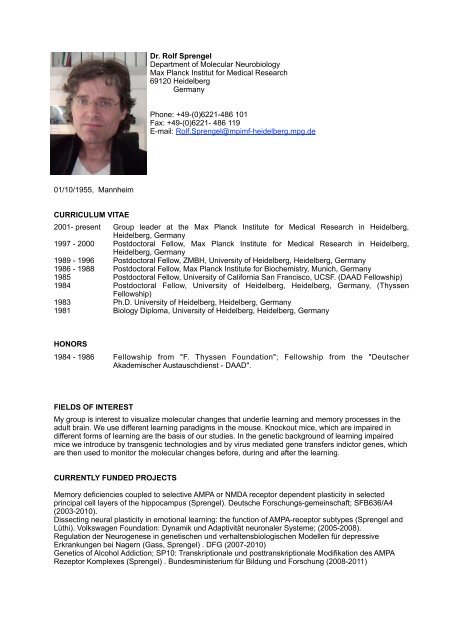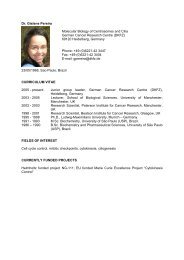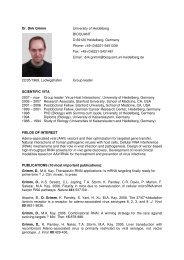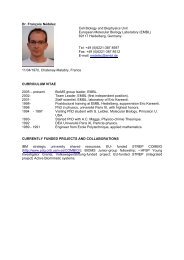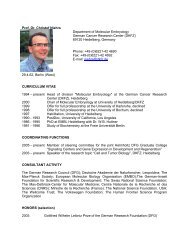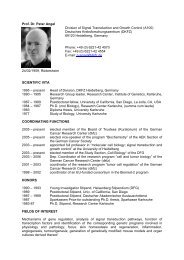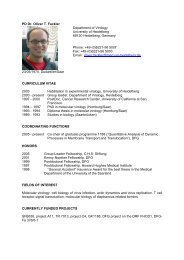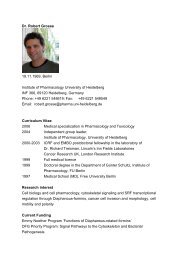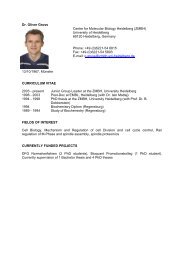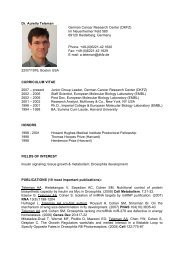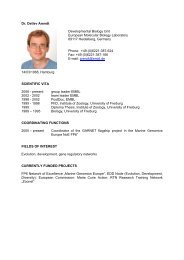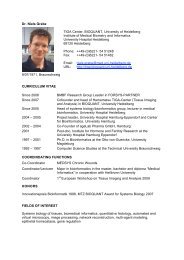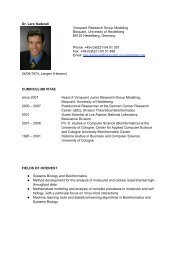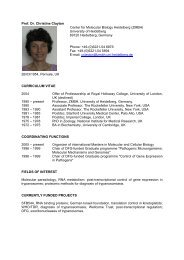Dr. Rolf Sprengel Department of Molecular Neurobiology ... - HBIGS
Dr. Rolf Sprengel Department of Molecular Neurobiology ... - HBIGS
Dr. Rolf Sprengel Department of Molecular Neurobiology ... - HBIGS
Create successful ePaper yourself
Turn your PDF publications into a flip-book with our unique Google optimized e-Paper software.
<strong>Dr</strong>. <strong>Rolf</strong> <strong>Sprengel</strong><br />
<strong>Department</strong> <strong>of</strong> <strong>Molecular</strong> <strong>Neurobiology</strong><br />
Max Planck Institut for Medical Research<br />
69120 Heidelberg<br />
Germany<br />
Phone: +49-(0)6221-486 101<br />
Fax: +49-(0)6221- 486 119<br />
E-mail: <strong>Rolf</strong>.<strong>Sprengel</strong>@mpimf-heidelberg.mpg.de<br />
01/10/1955, Mannheim<br />
CURRICULUM VITAE<br />
2001- present Group leader at the Max Planck Institute for Medical Research in Heidelberg,<br />
Heidelberg, Germany<br />
1997 - 2000 Postdoctoral Fellow, Max Planck Institute for Medical Research in Heidelberg,<br />
Heidelberg, Germany<br />
1989 - 1996 Postdoctoral Fellow, ZMBH, University <strong>of</strong> Heidelberg, Heidelberg, Germany<br />
1986 - 1988 Postdoctoral Fellow, Max Planck Institute for Biochemistry, Munich, Germany<br />
1985 Postdoctoral Fellow, University <strong>of</strong> California San Francisco, UCSF. (DAAD Fellowship)<br />
1984 Postdoctoral Fellow, University <strong>of</strong> Heidelberg, Heidelberg, Germany, (Thyssen<br />
Fellowship)<br />
1983 Ph.D. University <strong>of</strong> Heidelberg, Heidelberg, Germany<br />
1981 Biology Diploma, University <strong>of</strong> Heidelberg, Heidelberg, Germany<br />
HONORS<br />
1984 - 1986 Fellowship from "F. Thyssen Foundation"; Fellowship from the "Deutscher<br />
Akademischer Austauschdienst - DAAD".<br />
FIELDS OF INTEREST<br />
My group is interest to visualize molecular changes that underlie learning and memory processes in the<br />
adult brain. We use different learning paradigms in the mouse. Knockout mice, which are impaired in<br />
different forms <strong>of</strong> learning are the basis <strong>of</strong> our studies. In the genetic background <strong>of</strong> learning impaired<br />
mice we introduce by transgenic technologies and by virus mediated gene transfers indictor genes, which<br />
are then used to monitor the molecular changes before, during and after the learning.<br />
CURRENTLY FUNDED PROJECTS<br />
Memory deficiencies coupled to selective AMPA or NMDA receptor dependent plasticity in selected<br />
principal cell layers <strong>of</strong> the hippocampus (<strong>Sprengel</strong>). Deutsche Forschungs-gemeinschaft; SFB636/A4<br />
(2003-2010).<br />
Dissecting neural plasticity in emotional learning: the function <strong>of</strong> AMPA-receptor subtypes (<strong>Sprengel</strong> and<br />
Lüthi). Volkswagen Foundation: Dynamik und Adaptivität neuronaler Systeme; (2005-2008).<br />
Regulation der Neurogenese in genetischen und verhaltensbiologischen Modellen für depressive<br />
Erkrankungen bei Nagern (Gass, <strong>Sprengel</strong>) . DFG (2007-2010)<br />
Genetics <strong>of</strong> Alcohol Addiction; SP10: Transkriptionale und posttranskriptionale Modifikation des AMPA<br />
Rezeptor Komplexes (<strong>Sprengel</strong>) . Bundesministerium für Bildung und Forschung (2008-2011)
<strong>Sprengel</strong> _ page 2<br />
PUBLICATIONS (10 most important publications):<br />
Wallace, D., Zum Alten Borgloh, S., Astori, S., Yang, Y., Bausen, M., Kügler, S., Palmer, A., Tsien, R.,<br />
<strong>Sprengel</strong>, R., Kerr, J, Denk, W. and Hasan, M. T. (2008). Single-spike detection in vitro and in vivo with a<br />
genetic Ca2+ sensor. Nature Methods 5, 797 - 804.<br />
Humeau, Y., Reisel, D., Johnson, A. W., Borchardt, T., Jensen, V., Gebhardt, C., Bosch, V., Gass, P.,<br />
Bannerman, D. M., Good, M. A., Hvalby, Ø., <strong>Sprengel</strong>, R. Lüthi, A. (2007). “A pathway-specific function<br />
for different AMPA receptor subunits in amygdala long-term potentiation and fear conditioning”. J.<br />
Neuroscience 27: 10947-10956.<br />
Jensen, V., K.M. Kaiser, T. Borchardt, G. Adelmann, A. Rozov, N. Burnashev, C. Brix, M. Frotscher, P.<br />
Andersen, Ø. Hvalby, B. Sakmann, P.H. Seeburg, and R. <strong>Sprengel</strong> (2003). A juvenile form <strong>of</strong><br />
postsynaptic hippocampal long-term potentiation in mice deficient for the AMPA receptor subunit GluR-A.<br />
J. Physiology 553: 843-856.<br />
Mack, V., N. Burnashev, K.M. Kaiser, A. Rozov, V. Jensen, Ø. Hvalby, P.H. Seeburg, B. Sakmann, and R.<br />
<strong>Sprengel</strong> (2001). Conditional restoration <strong>of</strong> hippocampal synaptic potentiation in Glur-A deficient mice.<br />
Science 292: 2501-2504.<br />
Zamanillo, D., R. <strong>Sprengel</strong>, Ø. Hvalby, V. Jensen, N. Burnashev, A. Rozov, K.M. Kaiser, H.J. Köster, T.<br />
Borchardt, P. Worley, J. Lubke, M. Frotscher, P.H. Kelly, B. Sommer, P. Andersen, P.H. Seeburg, and B.<br />
Sakmann (1999). Importance <strong>of</strong> AMPA receptors for hippocampal synaptic plasticity but not for spatial<br />
learning. Science 284: 1805-1811.<br />
<strong>Sprengel</strong>, R., B. Suchanek, C. Amico, R. Brusa, N. Burnashev, A. Rozov, Ø. Hvalby, V. Jensen, O.<br />
Paulsen, P. Andersen, J.J. Kim, R.F. Thompson, W. Sun, L.C. Webster, S.G. Grant, J. Eilers, A. Konnerth,<br />
J. Li, J.O. McNamara, and P.H. Seeburg (1998). Importance <strong>of</strong> the intracellular domain <strong>of</strong> NR2 subunits<br />
for NMDA receptor function in vivo. Cell 92: 279-289.<br />
Brusa, R., F. Zimmermann, D.-S. Koh, D. Feldmeyer, P. Gass, P.H. Seeburg, and R. <strong>Sprengel</strong>. (1995).<br />
Early-Onset Epilepsy and Postnatal Lethality Associated with an Editing-Deficient GluR-B Allele in Mice.<br />
Science 270: 677-1680.<br />
McFarland, K.C., R. <strong>Sprengel</strong>, H.S. Phillips, M. Köhler, N. Rosemblit, K. Nikolics, D.L. Segal<strong>of</strong>f, and P.H.<br />
Seeburg (1989). Lutropin-choriogonadotropin receptor: an unusual member <strong>of</strong> the G protein-coupled<br />
receptor family. Science 245: 494-499.<br />
<strong>Sprengel</strong>, R., B. Reiss, and H. Schaller, Translationally coupled initiation <strong>of</strong> protein synthesis in Bacillus<br />
subtilis. Nucleic Acids Res. 1985. 13: p. 893-909.<br />
<strong>Sprengel</strong>, R., C. Kuhn, C. Manso, and H. Will (1984), Cloned duck hepatitis B virus DNA is infectious in<br />
Pekin ducks. J. Virology 52: 932-937.<br />
EXPERIENCE IN THE SUPERVISION OF DOCTORAL CANDIDATES<br />
Since 1993 Supervision <strong>of</strong> a total <strong>of</strong> 7 completed diploma theses, 10 completed doctoral theses,<br />
SUPERVISED DISSERTATIONS (last 5 years)<br />
Thilo, Borchardt, PhD (2003) Die Konstruktion von Mäusen mit veränderten AMPA-Rezeptoren. University<br />
Heidelberg<br />
Current occupation: Postdoctoral Fellow, Max Planck Institute for Heart and Lung Research, Bad<br />
Nauheim<br />
Derja Shimshek, PhD (2003) GluR-B: die wichtigste AMPA-Rezeptor-Untereinheit in der Maus. University<br />
Heidelberg<br />
Current occupation: Research Scientist. Novatis, Basel
<strong>Sprengel</strong> _ page 3<br />
Simone Freese, PhD (2004) Doxycyclin-kontrollierte Genexpression im ROSA26-Lokus der Maus.<br />
University Heidelberg<br />
Current occupation: Postdoctoral Fellow, Klinikum der Johannes Gutenberg-Universität, AG<br />
Waisman, Mainz<br />
Peixin Zhu, PhD (2006) Different genetic ways for Tetracycline controlled gene expression in the mouse.<br />
University Heidelberg<br />
Current occupation: Postdoctoral Fellow, Friedrich Miescher Institute for Biomedical Research,<br />
Basel<br />
Verena Bosch, PhD (2008) Genetic interference to study amygdala function in mice. University Heidelberg<br />
Current occupation: Research consultant, Scope International, Mannheim


